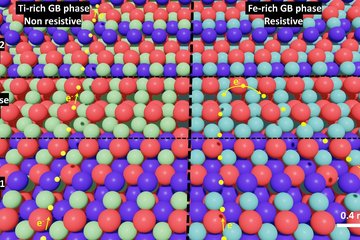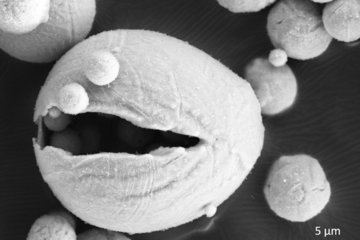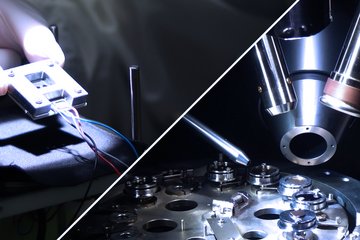All genres
1.
Journal Article
Ab initio explanation of disorder and off-stoichiometry in Fe–Mn–Al–C κ carbides. Physical Review B 95, 104108 (2017)
2.
Journal Article
First-principles calculation of the elastic dipole tensor of a point defect: Application to hydrogen in α -zirconium. Physical Review B 94 (24), 241112 (2016)
3.
Journal Article
First-principles investigation of hydrogen interaction with TiC precipitates in alpha-Fe. Physical Review B 93 (18), 184108 (2016)
4.
Journal Article
Rapid theory-guided prototyping of ductile Mg alloys: from binary to multi-component materials. New Journal of Physics 17 (9), 093009 (2015)
5.
Journal Article
Ab initio based understanding of the segregation and diffusion mechanisms of hydrogen in steels. JOM 66 (8), pp. 1399 - 1405 (2014)
6.
Journal Article
Ab initio study of H-vacancy interactions in fcc metals: Implications for the formation of superabundant vacancies. Physical Review B 89 (14), 144108 (2014)
7.
Journal Article
Vacancy formation energies in fcc metals: Influence of exchange-correlation functionals and correction schemes. Physical Review B 85 (14), 144118 (2012)
8.
Journal Article
First-principles study of the thermodynamics of hydrogen-vacancy interaction in fcc iron. Physical Review B 82 (22), pp. 224104-1 - 224104-11 (2010)
9.
Conference Paper
Identification of hydrogen related mechanisms in steels using ab initio methods. Proceedings of Steel Hydrogen Conference, Ghent, Belgium, September 28, 2011. (2011)
10.
Talk
Ab initio basierte Simulation zur Wasserstoffversprödung in hoch-Mn Stählen. Seminar der Staatlichen Materialprüfungsanstalt Darmstadt, Institut für Werkstoffkunde, Darmstadt, Germany (2020)
11.
Talk
An ab-initio prediction of the off-stoichiometry of Fe–Mn–Al–C κ carbides. CALPHAD XLV, Awaji Island, Hyogo, Japan (2016)
12.
Talk
Origin of the off-stoichiometry of Fe–Mn–Al–C κ carbides: An ab-initio explanation of atom probe tomography data. DPG 2016, Regensburg, Germany (2016)
13.
Talk
Ab initio explanation of off-stoichiometry in Fe–Mn–Al–C κ carbides. Intermetallics 2015, Bad Staffelstein, Germany (2015)
14.
Talk
Adaptive C content in coherently strained kappa-carbides - An ab-initio explanation of atom probe tomography data. TMS 2015, Orlando, FL, USA (2015)
15.
Talk
Adaptive C content in coherently strained kappa-carbides - An ab initio explanation of atom probe tomography data. 2nd German-Austrian Workshop on "Computational Materials Science on Complex Energy Landscapes", Kirchdorf, Austria (2015)
16.
Talk
Ab initio insights into the interaction of hydrogen with precipitates in steels. Workshop on Hydrogen Embrittlement and Sour Gas Corrosion 2015, Düsseldorf, Germany (2015)
17.
Talk
Ab initio determination of point defects and derived diffusion properties in metals. International conference on diffusion in materials, DIMAT2014, Münster, Germany (2014)
18.
Talk
Ab initio based understanding of the segregation and diffusion mechanisms of hydrogen in steels. SteelyHydrogen 2014, International conference on hydrogen in steels, Ghent, Belgium (2014)
19.
Talk
Impact of light elements on interface properties in steels. CECAM workshop “Modeling Metal Failure Across Multiple Scales”, Lausanne, Switzerland (2014)
20.
Talk
Ab initio based understanding of the segregation and diffusion mechanisms of hydrogen in steels. TMS Annual Meeting 2014, San Diego, CA, USA (2014)











